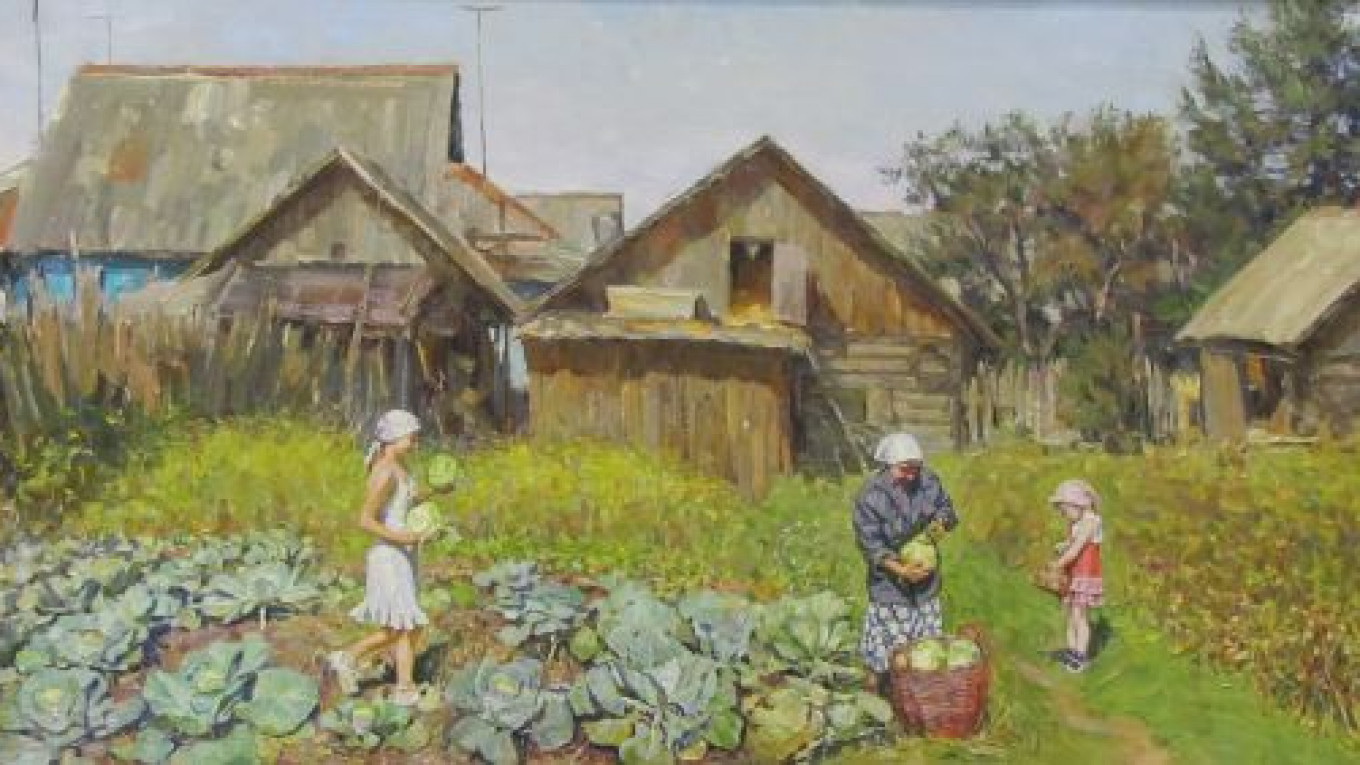A floor below the sprawling Soviet-themed exhibits at the State Museum of Contemporary History, a group of landscape painters is offering glimpses of a Russia seemingly untouched by the 20th century. With loose brushstrokes and brilliant colors, the Moscow River collective presents paintings that eschew cities’ steel and smoke for the soft light and open expanses of the countryside.
“Moscow is a chaotic city,” said artist Ilya Yatsenko, whose view of Moscow’s Pyatnitskaya Ulitsa is the exhibition’s sole urban scene. “Nature, on the other hand, is closer to a person.”
The group’s members often paint together in the woods and villages surrounding the “academic dacha” they maintain in the Tver region, where members Ivan Kugach and Boris Filippov live year-round.
Other scenes feature rural regions around various parts of Russia and Georgia.
In the Soviet era, Moscow River was spearheaded by artists at the Surikov Institute, including Vyacheslav Zabelin and Mikhail Kugach, who shared the artistic lineage of 19th-century Russian landscape masters such as Ivan Shishkin and Vladimir Korovin. While state-favored socialist realism achieved international prominence, with its idealized portrayals of robust workers building communism, realist works featuring natural subjects and an Impressionistic style did not reach most foreign markets until the 1990s.
The commercial success of the ’90s meant that Moscow River artists could now afford to stage solo shows and work separately. However, senior members gradually expressed concern about a “slipping of quality in the work of the newer generation.”
“There was a synergy created when you had a group of talented people coming together and sharing their experiences and complementing one another’s talents,” said Jonathan Wurdeman, an American artist who joined the group while studying at the Surikov Institute in the ’90s.
“An artist can’t critique his own work very objectively. … Everyone wants to think their newborn child is perfect,” he said. But when artists with a shared vision collaborate, “everybody benefits.”
At the initiative of Mikhail and his son Ivan, for the past three years the group has renewed its tradition of painting and exhibiting as a group.
The current exhibition features gentle variations on a handful of pastoral themes. Hens peck outside wooden houses, light shimmers across wooded roads and ancient churches brim with golden icons.
One painting shows a cabbage harvest in the countryside as two small girls help their mother.
Occasionally, two artists depict the same scene, such as Yatsenko and Wurdeman’s paintings of women planting the vineyard at Wurdeman’s Georgian ranch.
For all its familiarity, this traditional depiction of rural subjects, done collaboratively in the open air, makes the group’s work somewhat unique in today’s art world, where rustic landscape painting competes with newer forms of digital, urban-influenced art.
“We share a love of village life,” Wurdeman said. “And we have to look farther and farther to find it.
“Moscow River” is on display through Feb. 20 at the State Central Museum of the Contemporary History of Russia, 21 Tverskaya Ulitsa. Metro Pushkinskaya. Tel. 699-5458, www.sovr.ru.
A Message from The Moscow Times:
Dear readers,
We are facing unprecedented challenges. Russia's Prosecutor General's Office has designated The Moscow Times as an "undesirable" organization, criminalizing our work and putting our staff at risk of prosecution. This follows our earlier unjust labeling as a "foreign agent."
These actions are direct attempts to silence independent journalism in Russia. The authorities claim our work "discredits the decisions of the Russian leadership." We see things differently: we strive to provide accurate, unbiased reporting on Russia.
We, the journalists of The Moscow Times, refuse to be silenced. But to continue our work, we need your help.
Your support, no matter how small, makes a world of difference. If you can, please support us monthly starting from just $2. It's quick to set up, and every contribution makes a significant impact.
By supporting The Moscow Times, you're defending open, independent journalism in the face of repression. Thank you for standing with us.
Remind me later.






